‘What I’ve Always Dreamed Of’ – Seven Speaks On Producing ‘Special Effects’ [SM Exclusive]
May 1 2015
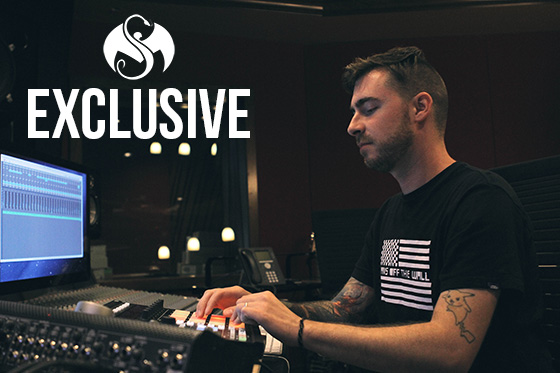
If they’re lucky, a producer will have the time and space necessary to produce at least one masterpiece in their career – a pinnacle work that changes the game and affects not only the genre, but the culture.
Strange Music in-house producer Seven has already changed the game with his innumerable contributions to the Strange Music sound, but with Special Effects, the soft-spoken producer with a penchant for ear-bleeding production may have crafted his magnum opus.
We talked to Seven to find out what went into producing the massive, epic, 24-track album that might just be the best of Tech N9ne’s prolific career.
How did Something Else and Strangeulation set the stage for what you guys wanted to do on Special Effects?
When we did Strangeulation, it kind of felt like we were making Special Effects. We had just gotten done with Something Else and then me and Tech started thinking about Special Effects – but then came Strangeulation. So when we got done with Something Else, we were talking about Special Effects, but then Strangeulation came along and the whole idea for what we wanted to do sound-wise for Special Effects was in my head. So I pretty much just did it on the Strangeulation, you know?
Strangeulation really came out the way it did and I was like, “Man, we did it too soon.” So then, we had to figure out what to do with Special Effects. It was kind of an extension of Strangeulation, but the only way to make Special Effects bigger than what we did on Strangeulation was to do pretty much everything I wanted to do, that I’ve been thinking about doing since I was a kid, on that album. I had been thinking about Special Effects since before we were done with Something Else. So, I knew it was going to be what it turned out to be. I just didn’t know exactly how I was going to do it, because Strangeulation was this thing that kind of came in the middle of that.
Yeah, so some of the techniques and the approach, I guess, you guys were talking about. We heard some of that on Strangeulation.
Yeah, if Strangeulation hadn’t happened, then Special Effects wouldn’t be what it is, because Special Effects probably would have ended up being more like Strangeulation. Which probably isn’t right, it needed to be bigger and better.
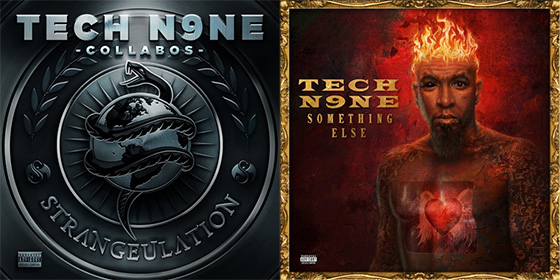
When did you start making Special Effects? When did that process start?
Immediately. When we were done with Strangeulation, we started working on this. For me, this is the longest I’ve worked on an album, consecutively, ever in my life. You know, when we did Everready, that was a big album, but I didn’t work on it. That wasn’t the only thing I worked on for that time.
I worked on Special Effects for a year straight. That’s the only thing I worked on, I feel like. Right after Strangeulation was done, we started working on it and “Speedom” was actually the first song we did on it.
What were some of the personal goals that you had for production? You just said everything you wanted to do, as a kid, you did on this album.
I’ve always dreamed of hiring full choirs and full string sections. Some of the ideas we did on this album, on particular songs, I was able to achieve. I just felt full, creative freedom on this album, which is what I’ve always dreamed of. It’s like somebody saying “Make an album, do whatever you want to do, hire whatever kind of musicians you want to hire, make the songs as big as you want to make them, don’t worry about format, don’t worry about any expectations, just make this piece of art.” And it’s exactly what I did on this album.
Now, with that freedom, there comes a responsibility to tailor something for Tech. Do you think you would you have been able to handle that responsibility for a full album, and do it in that way, when you first started? Or is making things for Tech something you’ve grown more comfortable doing?
Well, we first started working together on Everready, and a lot of people know the story of “Come Gangsta”, but to me, that song was the beginning of what I wanted to do. That was not like a normal production track. Every verse was different, and it changed, and it had so many different layers. It was basically a classical piece of music in hip hop form, to me. That’s kind of what I’ve always wanted to make.
I don’t think I could have made a whole album for Tech, back then, because over the years we’ve grown together. Our taste has grown together. We now see more eye-to-eye creatively than we’ve ever seen. Very little needs to be said to know exactly where we’re trying to go with it.
Yeah, because in that regard, then you can make a batch of things or a beat and Tech doesn’t come in and be like “what are you doing?”
Yeah, that never happens. I get it. I know what to do.
What were the discussions like with Tech as you guys decided what you wanted on the album, what you wanted it to sound like? Did he ever come in with any specific ideas? You just mentioned choirs. Did he ever go, “choirs?”
Concepts for songs and stuff, like “Speedom” were his concept. A lot of the songs were his initial concept, but then I just thought, what if we had a string section do this? Or what if we brought in a choir on this?
A good example of this would be “Dyin’ Flyin’ “. He didn’t know he wanted to call the song that, but he basically told me he wants to. That was the second song we did for the album. Let’s say you could hear “Straight Out the Gate“, we were doing these massive productions. He told me he wanted to do something that felt classical, but had “The Beast” type of tempo.
This was a good opportunity for me to work with Mark Lowrey, one of my favorite pianists, ever. He’s from Kansas City and I’m like, “Let’s work together on this.” Even though he’s not a classical piano player – he’s a jazz pianist – I knew that he could pull off what we were trying to achieve. So, you know, we started with that and it just grew into this thing. By the time we got done with it, I was like, “There’s a big piano outro on it,” and so I said, “Let’s add live strings to that,” and then, “Let’s add a humongous live choir.” And all of those things, all of those elements kind of came together.
So, this album was a lot different when coming up with the ideas. Before, I just made a track and either Tech felt like he wanted to write to it or he didn’t, and he did that and we recorded it or he didn’t. But now, it was like we just added, and added, and added, and shaped, and molded each song.
How do you think you grew, as a producer, doing this? Because with a lot of these processes, I think you’ve had some experience. I know you guys had the string section for “I’m Not a Saint”. I know you’ve worked with musicians before, but was the scale of this album pretty new to you?
Yeah. It’s like you said, I’ve definitely done it on a smaller scale, but now, I would get musicians involved from the beginning of the idea, paint this whole picture for them, use them more, rather than just to accent something that I’ve done. I would bring everybody in and just direct everything, and coordinate everyone. So, on this, the musicians are really a much more intricate part of the album than ever. It’s so important.
You can definitely hear that on “Dyin’ Flyin'”. That’s a great example for me, because the piano really drives it, and it picks up, and it accelerates.
Yeah, the way we did that, too, was that we actually recorded that song in the basement of this old restaurant in Kansas City, The Majestic. I liked the way the piano sounded down there, it was this really interesting shaped room, and the acoustics are really interesting down there. We pretty much just went down there and recorded the piano. I just told him to play. We didn’t record to a click or anything, he just played. I would help with direction, tell him “like this”, or “like that.” You know, “go more this way,” “go more that way,” “more of this,” “more of that.” Then, I took all of the pieces, which were all like random tempos and just randomness everywhere, I just took them back to the studio and treated it like a sample, piecing everything back together. Things were time-stretched, things were pitched, things were chopped up and all over the place. Then those pieces became the meat of that song. We started with Mark. Before I did anything else on that song, we went and tracked those pianos. So that was the total inspiration for everything.
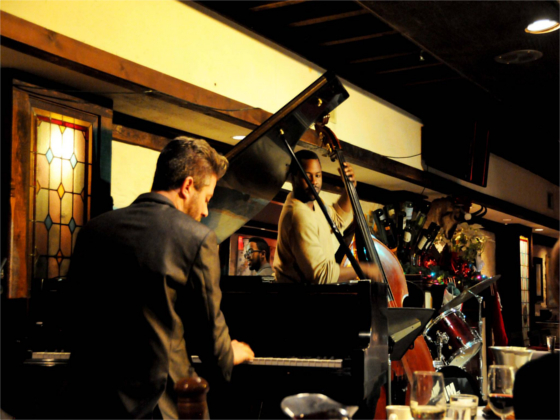
By now you probably have a sense when you have enough raw clay to work with. I could imagine that being a little nerve-racking, because you have all this raw material, what if it doesn’t click into a track right?
That definitely has happened, for sure. But, when we’re recording something, I know when I’ve got it. I get this feeling and I was like “Oh, that was it. That right there was ‘it’.” With all of these songs on this album, that moment happened. I can almost remember with every single song specifically when that moment happened.
Where you were just like, “I got it, we’re good?”
I was like “Yeah, this is it.” When I’m making a track, or whatever, I pretty much work on the track until I get that feeling. Something will hit me and be like “oh, there, that’s it, this is going to work”. And if I don’t get that feeling, no one really ever hears the music, for real. Working with these musicians on Special Effects, I got that feeling when we were recording the live parts, so I knew it was going to work.
Speaking of going down to record at The Majestic, you and engineer Ben Cybulsky embarked on most of this journey together, coming up with some pretty innovative recording techniques. What are some instances of that which stick out in your mind?
Ben pretty much just had to go along with all of my crazy ideas for this album. A lot of them seemed, at the beginning, pretty ridiculous. It was really cool. It was just fun to experiment this way. We recorded on location a lot. I don’t know if you’ve heard the story of how “Worldly Angel” was put together?
I think I’ve heard a little bit. That’s where you actually pressed a recording to vinyl and sampled it, correct?
It was press-to-vinyl, yeah.
And that worked out?
Yeah. That was probably the biggest production of my whole, entire, life – that song. It took three months to make. I told Tech about the idea while he was on tour, and he was like, “Yeah, sounds like a great idea, do it.” I was like, “Yeah, I’m going to do this.” I’ve wanted to do this for so long.
Why would you need to do that? Why can’t you just record direct? What is it about a vinyl and sampling in that way that made that a necessity?
Well, coming off the vinyl, there’s a certain…I don’t know, I call it the “Whoomphiness.” There’s some bass frequencies and it’s just the sound of the needle transmitting the sound that you can’t get off of just a recording. I can always tell when I listen to something that’s sampled, I can tell if it was sampled off of a record or an MP3. I can tell the difference because there’s a thickness, a richness, and a fatness to the vinyl. Whenever I used break-beat drums I always, if possible, try to sample it directly from vinyl, because the way a kick sounds sampled off of vinyl is just… I don’t know how to match that. The thickness of the drums – I really wanted to capture that.
Take us back through the process of getting all this made from beginning to end, this track.
I’ve wanted to do this forever. I wanted to make my own, actual samples. I actually had the idea for the song. I told Tech we should call the song “Worldly Angel”. I knew that I wanted it to be something that sounded like, late-seventies soul music. Really soulful, big, lush strings on it, harp – but really dark still. I wanted this to be soulful, but still Tech.
I knew I wanted it to be the last song on the album, to be a song that had a lot of meaning. The way it began was we brought Mark Lowrey in and I had him play Rhodes on it. We just recorded a real Rhodes, a ’73, and I got all the parts, and used that as the building blocks for this song. From there, we brought in a drummer. Ben actually played guitar on it, the bass player, drums, Steve Lambert played live flute on it, harp, the strings. Everything was just completely live on it.
I knew I wanted vocals to be on it also. I actually, first of all, bought one of the second ribbon microphones ever made, RCA 44, which is like the microphone that Elvis Presley recorded with. We bought one of those for the studio so we could use it on this song. That was the sound of the vocals I was trying to get. I worked with a friend of mine, his name is Isaac Cates, he’s another producer, a choir arranger. I worked with him picking out the vocalist I wanted and worked with him on writing the part. I was going to have a female vocalist sing the part on it and we basically found the right singer, convinced her to do it, of course, because it was a Tech N9ne song and she’s from a Baptist choir.
So she’s used to predominantly doing non-secular music.
Yeah, definitely a gospel background and that was already a tricky thing, you know? But she was down. We made it happen. We wrote something really meaningful, recorded it, and it all came out perfect.
When I had the whole song done, I was like, “Okay, now the production has just begun.” It took months to put that together. I sent it off and had it put on vinyl. We got the vinyl back, and I got out my MPC 4000, which I haven’t used in years and years. I set it up with the SL 1200, made the beat, and started from scratch.
What was Tech’s reaction to hearing that?
Well, I was like, “I really hope he likes this because I spent three months of my life working on this!” He got back from tour, I worked on it the whole time he was gone on tour, and he got back and he loved it.
Well, that’s good.
No, he loved it.
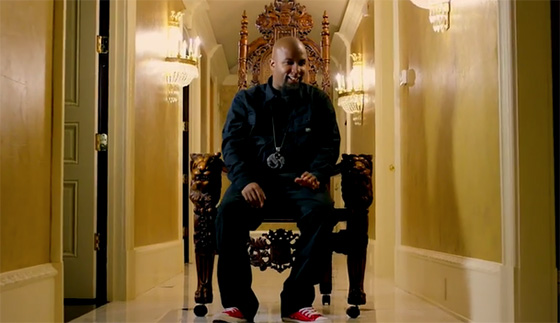
That’s one of my favorite productions, for sure.
There’s enough room on the record that I can have the regular version, the instrumental, the acapella, some of the vocal outtakes. All of these little pieces that I could work with if I need to, so it would all be separated if I needed to add anything. Tech, of course, he just wanted to keep listening to that. He was in love with just the sample by itself, which is something that I would love to someday let everyone else hear – what just the sample sounds like, because it in itself was amazing.
Would that be the zaniest thing that you did? I hate to say zany because there’s method in there, it makes sense, and it came out wonderfully. But, what’s some of the craziest shit that you guys did during the making of this album-to get sounds and what you needed?
That one’s pretty crazy, you know? Going and recording the pianos on the location was crazy – using The Majestic. We recorded pianos in a bunch of different areas on this album. On “Psycho Bitch III”, we had everyone come up into the studio. Just a ton of people and we got boundary microphones and taped them to the floor. We let everybody stomp on the ground for the stomps during Hopsin’s verse on the third verse. I got trash cans and banged on those for the snare, on the third verse. Just got those humongous sounds. Anywhere I could do something live, I did. On “Wither” recorded a keg, just throughout the song and used all of the little pieces of it. Not just as the keg hitting; but I would use it, slow it down, pitch it down, put a weird effect on it, and use it as texture within the song. Just all kinds of stuff, man.
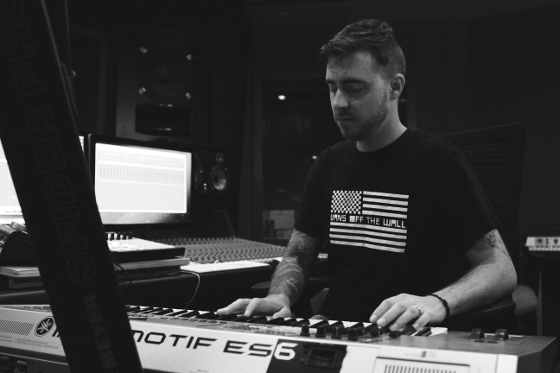
Can you point to a specific production on the record that you’re the most proud of? I know it’s like picking babies, but is there one that stands out most to you?
Ha! I guess you’re right, that’s a really hard question. I mean, there’s just so much stuff, man. Probably “Dyin’ Flyin'”. I’m thinking about all the stuff we used…like the toy pianos we used in “Shroud”. We’ll talk about that, but even the intro “Intervention”, coordinating that whole thing with the choir, programming that. That deal was just so big.
“Dyin’ Flyin’ ” is probably like my magnum opus, you know? I feel the way about “Dyin’ Flyin’ ” the way I felt about “Come Gangsta” when I got it done. When I finished “Come Gangsta“, back in 2004, like ten or eleven years ago, I felt a certain way. I was like, “I’ve done something here,” and I feel like that about “Dyin’ Flyin'”.
I would have to agree, man, that’s certainly on some other shit. I’ve never heard classical and hip hop kind of form this new thing.
Yeah, people have done it. I don’t think that’s a new thing.
But it’s done in a way to where it does justice to, I don’t know. It sounds like I’m at an opera house or something. Or it sounds like I’m at a concert hall. It sounds…
It sounds like Tech N9ne, man. To me, when I made that beat, I wanted people to be like, “Oh, there’s only one person that could do something like that – Tech N9ne.” That’s his sound to the fullest. It’s like the epitome of the Tech N9ne sound.
How do you think you’ve grown as a producer since you did Everready?
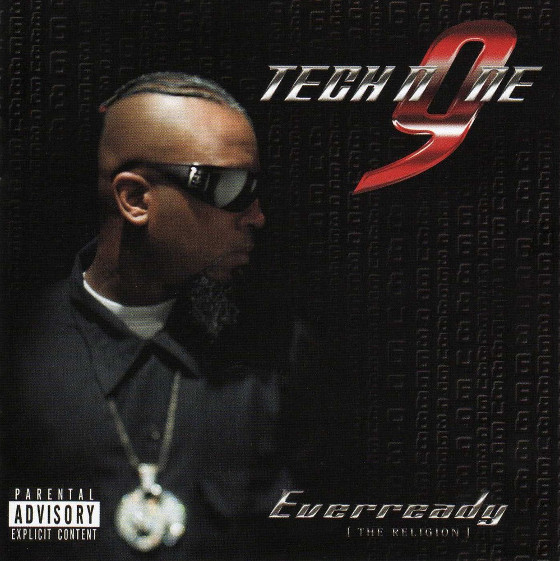
Oh, man, tremendously. I’ve always known it’s important to have a signature sound and it’s been hard to do, because I’ve had to work with so many different kinds of artists. I feel like I do that well. I feel like I can morph myself into a different kind of producer, especially now.
I’m starting to figure out, more than ever, how important it is or how to have more of an exclusive sound. I feel like I really did it on Special Effects. I felt like I did things that no one has ever done. I did things that were ideas that weren’t necessarily inspired by something that I’ve heard before. They’re just ideas that came out of nowhere, that I’ve never heard anyone ever do.
For the most part, I’ve had these ideas but never thought I’d ever be able to achieve them, but this is the album that I was like, “Let’s just try to go for it.” I figured out how to not only work with musicians on all different levels, but how to turn that into a signature sound.
Definitely. What do you think about Tech’s performance on this record? We talk about this every time there’s a new Tech record. I always wonder if he’s going to be able to blow me away in a way that I haven’t heard before, and he continues to do it. Did he do that on this record?
I always think that of every album, he’s improving. But, this album, man. I could just feel that he cared bar for bar, lyrically more than he ever has. I think he knew this album had to be what it is. We talked about that this whole time. This album really has to symbolize something in his career. Because of that, what he wrote, and the way he performed was so on point.
It’s the most well put together it’s ever been. He always does really well with putting things together, of course. This album sounds like he’s hungry and that’s hard to get when you’re so accomplished. I feel like you could hear the hunger in Anghellic, you could feel the hunger in Absolute Power. Not that Tech hasn’t always been hungry, but on this album, it sounds like he’s trying to prove something.
It seems like, after hearing it a few times, it’s something new but something you want from Tech N9ne at the same time. It seems to be a very quintessential Tech N9ne record. I think it could go down as one of those.
I feel like it’s the most perfect Tech N9ne album. Anghellic is my favorite album that he’s done. Anghellic is because of what he did lyrically, but I feel like this album now, is the perfect marriage of everything like production and quality and, of course, Tech’s performance.
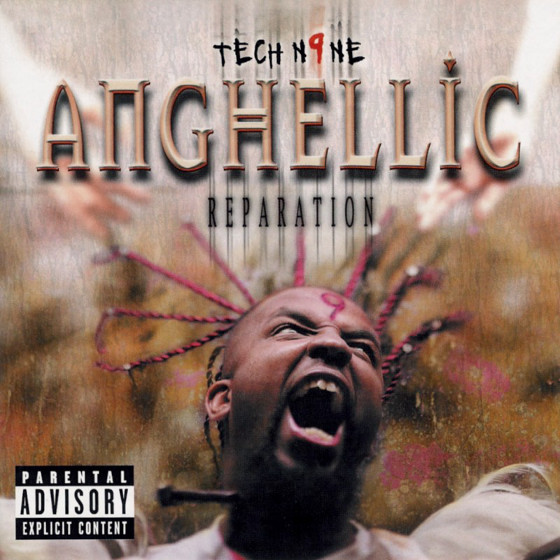
Do you have anything about the record before we wrap this up?
Being that it’s the record that I’ve wanted to make since I was a kid, I feel like I really accomplished something with this album.
What did you feel like before you started making this, man? You’re at that level to where it’s like “I can do stuff and I’ll kill it every time. I’m a fucking pro, this is what I do, and I’ve been doing this forever.” But, this is a tall order. This is the first Tech N9ne record that you’ve produced the majority of, from top to bottom.
I did all of it except for two songs, maybe? Yeah, the Excision song and “Hood Go Crazy” track. I think that it was appropriate, though, because the sound was so unique.
If you listen to this album, it’s a really hard thing to describe. I don’t even know how to describe this album without you just hearing it, so it would be really hard for someone to come into this world, unless they were just right there with us, going through it. It’s just so unique.
Coming out of Strangeulation and Something Else, I was like, “I don’t know how we’ll top that.” Once I started thinking along the lines of don’t worry about that, just experiment. Just try new things and just try out those ideas that you’ve been thinking about your whole life – this is your opportunity. I just set everything aside and didn’t worry about the expecations. I mean, as crazy as it sounds to me, it’s the way that I think – which is probably bad – but I was like, “Let’s not worry about singles. Let’s not worry about manufacturing a sound. Let’s not worry about what anybody’s going to say or think. Let’s just make music that we love.” I know that sounds kind of cliché, but I’ve never been able to make an album where I don’t have to worry about any of those things. This was that album.
That’s crazy to me because it’s also the biggest album you’ve ever done. Where you have the pressure of that, but you also have the freedom that you described while making it. It’s not so often that those two things come together.
Yeah, I don’t know how people are going to receive the album. I don’t know what anybody will think about it. I’m really excited about that! All I can say, for sure, is that I did what I wanted to on this album. There’s nothing that I’m looking back and being like I should’ve done that, or it should’ve been more like this. It was all just exactly as I imagined it.
- What are your expectations for the production on Special Effects?
- Do you think this could be as big as the expectations have made it out to be?
Leave your thoughts in the comments section below!

